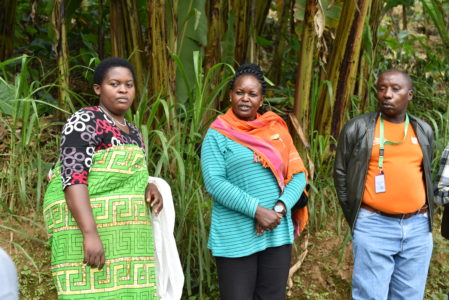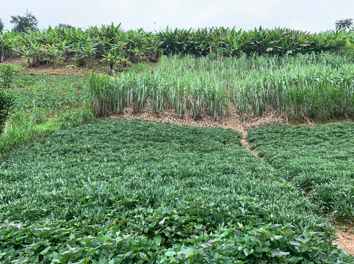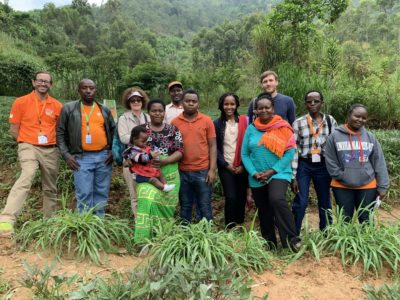Jeanne Mukasine hails from Gakenke district in the northern reaches of Rwanda, the country of a thousand hills.
Mukasine wears many hats —farmer, mother and wife. She is also a successful agri-preneur.

On two of her three-hectare land, Mukasine grows and sells sweetpotato planting material of improved biofortified orange-fleshed sweetpotato varieties. The rest of her land is used to grow pineapples, sugarcane and banana. Mukasine is part of a group of 70 commercial sweetpotato vine multipliers, who have been working the past eight years with the Rwanda Agriculture and Animal Resources Development Board (RAB) and the International Potato Center (CIP) to develop more effective seed systems and sweetpotato varieties.
In February 2020, Mukasine hosted a group of researchers from Peru, the US, and Eastern, Central and Southern Africa to conduct field activity to understand the needs of smallholders regarding new sweetpotato varieties, seed delivery systems and how sweetpotato farming can make a positive impact on livelihoods. Mukasine shared her experiences with the group, who are part of the SweetGAINS (Genetic Advances and Innovative Seed Systems) project, sponsored by the Bill and Melinda Gates Foundation. SweetGAINS seeks to accelerate and expand the development and dissemination of nutrient rich, climate-resilient sweetpotato varieties to benefit millions of African families.
Initially, Mukasine obtained seed through projects offering free starter material. Having seen the benefits that come with using disease-free vines, she decided to start purchasing quality-guaranteed planting material produced in insect-proof net tunnels or screen houses. She also prefers to diversify her land and have at least two varieties of sweetpotato on her farm instead of just one. This diversity has helped manage and mitigate risks related to disease and climatic conditions, such as drought or excessive rainfall.

Through testing and study, Mukasine grows Kabode and Vita sweetpotato varieties, which were developed in Uganda through the efforts of CIP’s Dr. Robert Mwanga (one of four 2016 World Food Prize awardee) and his team, working closely with National Agriculture Research Organization (NARO) researchers.
The business side
Being a successful producer of sweetpotato vines is only of limited use unless a farmer can find a market for their produce. Mukasine advertises hers through a signpost at the main road, directing people to her home. Her clients include several non-governmental organizations, government agencies, and individual farmers. She is the first-choice supplier of quality planting materials when local farmers need to restock.
Mukasine has established a network with other producers to expand the geographical scope of her business. She sells her sweetpotato planting material as far as 45 kilometers away from her farm in Kigali. But finding selling points is not enough. Understanding the dynamics and willingness for diverse customers to pay is important and helps to set appropriate prices. Mukasine’s annual sales from vines is about USD 3,000 but over the last two years she earned USD 10,000 due to increased demand for her quality sweetpotato planting material.
The income improves Mukasine’s life in many ways, but she appreciates how the money allows her to educate her children and she sends her son to a local private university at Musanze.

Mukasine is not alone. Several women in her neighborhood have begun seed production businesses, inspired by her success.
Breeding better varieties faster
Over the next three years, SweetGAINS will employ cutting-edge science and methods through CIP’s regional breeding platforms in Mozambique and Uganda to modernize national sweetpotato breeding programs in Africa. At the same time, it will stimulate the creation of seed systems to deliver quality sweetpotato planting material to resource-poor farmers in Africa.
Launched in early October 2019, SweetGAINS activities will be focused in seven African countries: Ethiopia, Malawi, Mozambique, Rwanda, Tanzania Uganda and Zambia.
By Hugo Campos and Séraphine Uzamushaka
